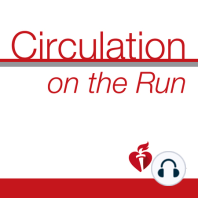20 min listen
Circulation February 8, 2022
ratings:
Length:
21 minutes
Released:
Feb 7, 2022
Format:
Podcast episode
Description
Please join author David Webb and Editorialist Steven Smith as they discuss the original research article “Regular Acetaminophen Use and Blood Pressure in People With Hypertension: The PATH-BP Trial" and the editorial "Acetaminophen-Induced Hypertension: Where Have All the "Safe" Analgesics Gone?" Dr. Carolyn Lam: Welcome to Circulation On The Run, your weekly podcast summary and backstage pass to the journal and its editors. I'm your host today, Dr. Carolyn Lam, associate editor from The National Heart Center in Duke National University of Singapore. And I'm so missing my co-host Dr. Greg Hundley, who can't make it today, but will be back next week. Now, I have the privilege of telling you all about the exciting papers in today's issue, but before I even get there, I need to let you know that coming right up is a discussion you are not going to want to miss. It deals with an issue that we encounter very commonly and perhaps should have questioned many times, but haven't yet. What is it? Well, regular acetaminophen use and its blood pressure effect. Acetaminophen, what we commonly call paracetamol or Tylenol depending where you're coming from, but have we ever stopped to really ask, does this impact blood pressure? We're going to find out more in the path BP trial coming right up, but first here are your summaries. Dr. Carolyn Lam: The first original paper I'd like to tell you about is a study representing additional four years a follow up from the Danish trial. Now recall that Danish was a trial that found that primary prevention ICD implantation was not associated with an overall survival benefit in patients with non-ischemic systolic heart failure, doing a median follow-up of 5.6 years. Although, there was a beneficial effect on all-cause mortality in patients aged 70 years or younger. Now, the current study led by Dr. Lars Køber from Copenhagen University Hospital and colleagues showed that during a median follow up of now 9.5 years, ICD implantation did not provide an overall survival benefit in patients with non-ischemic systolic heart failure. In patients age 70 years or younger, however, ICD implantation was associated with a lower incidence of all-cause mortality, cardiovascular death, and sudden cardiovascular death. Dr. Carolyn Lam: The next original paper reports on pre-specified analyses from the FIGARO-DKD trial assessing the impact of finerenone known on clinically important heart failure outcomes. Now recall that FIDELIO-DKD and FIGARO-DKD, in those trials finerenone, which is a selective nonsteroidal mineralocorticoid receptor antagonist, improved cardiovascular outcomes in patients with albuminuric chronic kidney disease and type two diabetes. In the current study, Dr. Filippatos from Attikon University Hospital in Athens, Greece and colleagues presented the pre-specified analyses of FIGARO-DKD describing novel heart failure related outcomes, which were not previously published in finerenone studies, and these included new onset heart failure. Different outcomes containing first or total hospitalization for heart failure events in the overall population. The results indicated that in patients with chronic kidney disease and type two diabetes on a maximum tolerated dose of renin-angiotensin system inhibitor therapy, fenerenone reduced new onset heart failure and improved heart failure related outcomes irrespective of history of heart failure. This is the first indication that a nonsteroidal mineralocorticoid receptor antagonist may provide benefit in a population with chronic kidney disease and type two diabetes, in which patients with heart failure with reduced dejection fraction or symptomatic NYHA 2-4 were excluded, thus indicating that patients with type two diabetes and chronic kidney disease at risk of heart failure or with early stage heart failure may indeed benefit from fenerenone treatment. Dr. Carolyn Lam: The next original paper shows for the first time, a role of the nuclear receptor Rev-Erb, a ke
Released:
Feb 7, 2022
Format:
Podcast episode
Titles in the series (100)
Circulation December 19/26, 2017 Issue: Circulation Weekly: Your Weekly Summary & Backstage Pass To The Journal by Circulation on the Run
